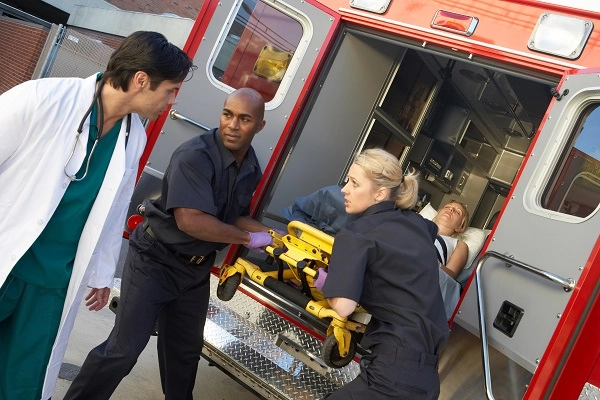Make the right call: Why 911 is faster and safer during heart attacks

If you or someone you know is having heart attack symptoms right now, call 911 immediately. Getting help quickly can save a life.
Heart attacks are sudden and terrifying. When every second counts, knowing what to do can mean the difference between life and death. The American Heart Association strongly urges calling 911 instead of driving to the hospital. A study published in the Circulation Journal by the American Heart Association found that for every 30 minutes saved during a heart attack, the risk of dying within a year goes down significantly. The quicker you get treatment, the less heart muscle is damaged. Taking an ambulance can help get you the medical care you need much faster.
Understanding heart attacks
A heart attack is a serious medical emergency that happens when one or more of the arteries supplying blood to the heart muscle become blocked. Without enough blood, the heart can't get the oxygen it needs. And without oxygen, the heart can be permanently damaged.
Once you've had one heart attack and your heart is damaged, you're at a higher risk for having another heart attack or other heart issues such as irregular rhythm, weaker pumping and further heart failure. Heart damage can make everyday activities hard. You might get tired easily or have trouble with exercise or even walking.
How does a heart attack happen?
The arteries that supply blood to the heart can become narrow over time because of a buildup of fatty substances called plaque. Sometimes, this plaque can crack, causing a blood clot to form. If the clot blocks the artery completely, the blood flow to part of the heart muscle is stopped, leading to a heart attack.
What are the symptoms?
Heart attack symptoms can vary from person to person, but common signs include:
- Chest pain or discomfort: This might feel like pressure, squeezing, fullness or pain in the center of the chest. It might last for several minutes or go away and come back.
- Pain in other parts of the body: Pain or discomfort can spread to the arms, back, neck, jaw or stomach.
- Shortness of breath: This can happen with or without chest discomfort.
- Cold sweat, nausea or lightheadedness: These symptoms can occur along with others or on their own.
Heart attacks can be different in severity and symptoms. Some are intense and sudden, while others might start slowly with mild pain or discomfort. Symptoms may be different for women, older people and people with diabetes.
Why calling 911 matters
During a heart attack, time is critical. The longer the heart muscle goes without oxygen, the more damage can occur. That's why recognizing symptoms and calling 911 right away is so essential.
You might think driving to the hospital is faster. But calling 911 can save more time and, most importantly, save your life.
- Immediate care from EMTs
When you call 911, emergency medical technicians (EMTs) come to you. They can start medical care right away. This is something you won't get if you drive.
- Safe and fast transport
EMTs know how to get to the hospital quickly and safely. They can bypass traffic and have the right tools on board to help you. If your condition worsens in the car, there is no way to address your worsened condition.
- Early hospital communication
EMTs can talk to the hospital, so everything is ready for your care as soon as you get there.
The risks of driving
Driving to the hospital might seem like a good idea, but it can be very risky.
- Stress and panic: Heart attacks are scary. Driving can cause stress and panic for both the driver and the patient.
- Traffic and delays: You can get stuck in traffic or delayed by other issues.
- Lack of medical support: Without medical support, things can get worse fast.
- You could cause a crash: Whether the driver or passenger is experiencing a heart attack, the driver is going to be distracted and could cause a crash.
Advantages of treatment in an ambulance
- First aid: EMTs can provide first aid and important medications.
- Monitoring: They can watch your heart and make sure it's working right.
- Communication: They can talk to the hospital doctors, sharing important information.
A closer look at AHA data
The AHA has done a lot of research on this subject. Here's what they found:
- Faster treatment with 911: People who call 911 get treated up to 20 minutes faster. That can mean the difference between a full recovery and permanent damage.
- Better survival rates: The survival rates are better for people who take an ambulance.
- More complete care: EMTs provide care that you won't get in a car, helping your heart stay strong.